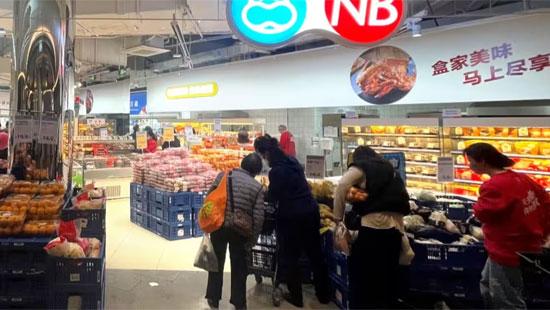04 Mar 2024 - {{hitsCtrl.values.hits}}
 SHANGHAI -- China's benchmark yield has dropped to a record low amid deflationary pressures, signaling a heightened risk of the long-term economic stagnation that has plagued Japan.
SHANGHAI -- China's benchmark yield has dropped to a record low amid deflationary pressures, signaling a heightened risk of the long-term economic stagnation that has plagued Japan.
The yield on China's 10-year government bonds briefly touched 2.341% on Thursday, according to the London Stock Exchange Group. This is the lowest reading in available LSEG data, dipping under the previous trough of 2.352% from June 5, 2002.
The yields rose Friday to close at around 2.38%.
The common thread between Thursday and 2002 is deflationary pressures. Back in 2002, state-owned Chinese banks were grappling with nonperforming loans, which led to depressed internal demand. As a result, the consumer price index was on decline.
This time around, the slumping real estate market has weighed down on inflation. The CPI undershot year-earlier numbers for four consecutive months through January. The core CPI excluding volatile food and energy prices rose just 0.4% for January.
Retailers, desperate to draw customers, joined an excessive price-cutting race, creating a state of disinflation. Alibaba Group Holding's Hema Xiansheng supermarket chain is stepping up the opening of discount outlets, where red wine from Spain goes for as little as 9.90 yuan ($1.38).
Before the Lunar New Year holiday began Feb. 10, the Chinese authorities rolled out a series of measures to prop up share prices, including a crackdown on "malicious" short-selling.
This regulatory push has resulted in the Shanghai Composite Index gaining 8.1% in February, its best run in 15 months.
But in the fixed-income market, yields have fallen in proportion with the length to maturity. The 30-year yield was the first to hit an all-time low, and on Thursday it touched 2.451%.
The spread between 30- and 10-year yields has narrowed to the 0.1 percentage point range from more than 0.8 point in April 2020. Deflationary pressures and the population decline have dampened hopes of high growth and higher inflation over the ultralong term.
Market outlooks on the economy and inflation can be derived by reading yield curves. A steep curve traditionally indicates boom periods, while a flat curve serves as a leading indicator of a downturn.
China has not yet devolved into an inverted yield curve where short-dated yields exceed longer-term yields. But its yield curve has been flattening.
"City and rural commercial banks are notable buyers of 30-year bonds," Huatai Securities analyst Zhang Jiqiang said.
Banks usually hesitate to invest in long-dated bonds. But with long-term inflation outlooks fading, banks appear to have stepped up purchases of 30-year government bonds in pursuit of higher yields.
The focus has now turned to whether financial authorities will go further with monetary easing. On Feb. 20, the People's Bank of China lowered the over-five-year loan prime rate by 25 basis points to 3.95%. The loan prime rate is used by banks as a benchmark for setting mortgage rates.
This move comes on the heels of the PBOC lowering reserve requirements for commercial banks on Feb. 5. But now that real interest rates are elevated amid low inflation, there is room for more policy easing, said an analyst at Cinda Securities.
The annual National People's Congress begins on Tuesday. Many analysts believe the leadership may signal upcoming financial stimulus measures during the session.
26 Dec 2024 1 hours ago
26 Dec 2024 1 hours ago
26 Dec 2024 2 hours ago
26 Dec 2024 2 hours ago
26 Dec 2024 4 hours ago